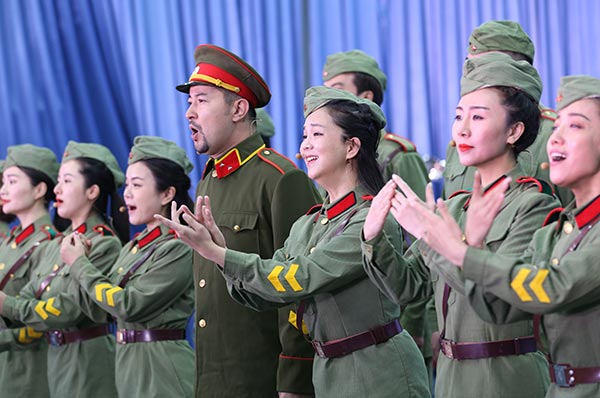Poetry then, songs now
 |
|
Performers sing songs composed by Gu at the rehearsal hall of the China Oriental Performing Arts Group in Beijing. [Photo by Zou Hong/For China Daily] |
Gu started her project with six Tang poems. Then, after she met a girl who was recording a song adapted from A Traveler's Song in a studio in 2005, she decided to work on such compositions even more.
"When the 6-year-old told me her grandmother has read the poem to her many times and she knows what the poem is about, I thought I should continue with the project," says Gu. "These traditional texts contain Chinese philosophy, culture and history, all great material for education."
While composing the songs, Gu went through a tough time-her husband and daughter died in 2016. Gu then suffered from depression and stopped working for a year.
"I underwent medical treatment but I knew it was music that would heal me. When I sat down in front of the piano to compose, I felt better," says Gu.
She says her late husband and daughter had been supportive of the project, and she doesn't want to let them down by not going through with it.
Born in the Japanese city of Osaka, Gu returned to China with her parents in 1942. She loved music from childhood and her parents bought her a piano when she was 10.
In 1955, Gu graduated from Liaoning province's Shenyang Conservatory of Music and started working as a composer for the China National Song & Dance Ensemble, which was then known as the Central Song and Dance Ensemble.
She has been writing pop songs since the early 1980s. Young Friends Come Together, released in 1980, has been incorporated by UNESCO into its music teaching material for the Asia-Pacific in 1983.
At the fourth international pop music festival held in 1987 in Belgrade, Gu's work-The Green Leaves' Love for the Root-performed by pop star Mao Amin there, won the third prize, the highest award a Chinese pop song received at a global event then.
As a member of the National Committee of Chinese People's Political Consultative Conference, she has used her image to raise awareness about copyright protection for musicians.
Song Guanlin, the general manager for the China Oriental Performing Arts Group, says when he visited Gu to discuss the project, she told him that he should know promoting songs for children would be hard.
"The music market is dominated by commercial pop. Few companies want to invest in children's music, which is not profitable. The situation is disappointing but Gu never gave up the idea," says Song.
In 2005, the China Oriental Performing Arts Group was formed after the merger of two national platforms for singers and dancers-the China National Song & Dance Ensemble, set up in 1952, and the China Oriental Song & Dance Ensemble, founded a decade later.
"Some young, talented people in our group will perform in the concert. They will turn Gu's compositions into a reality on the stage. It's a great honor for them to perform," he adds.
















